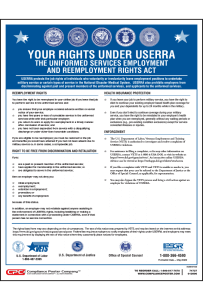 Today we observe Veterans Day, the federal holiday dedicated to honoring veterans of the U.S. armed forces. While it is important to spend this one day a year in recognition of their military service, it is equally important that we spend the other 364 days ensuring that we’re providing veterans with the tools and opportunities they need to succeed in civilian life. Although the unemployment rate for the veteran community is currently at a record low of 2.7 percent, a recent survey found that veterans are still disproportionately underemployed as compared to the general population.
Today we observe Veterans Day, the federal holiday dedicated to honoring veterans of the U.S. armed forces. While it is important to spend this one day a year in recognition of their military service, it is equally important that we spend the other 364 days ensuring that we’re providing veterans with the tools and opportunities they need to succeed in civilian life. Although the unemployment rate for the veteran community is currently at a record low of 2.7 percent, a recent survey found that veterans are still disproportionately underemployed as compared to the general population.
Veterans experience specialized challenges in employment, particularly when they first enter into the non-military workforce. Former service members have to integrate into a radically different organizational structure with unfamiliar goals and experiences, often without having prior experience of working in the civilian world. Cultural differences between the civilian and military fields can make it difficult for employers and veterans to understand each other, and veterans may be the subject of stereotyping or stigma from those with little experience of service members.
 Veterans and returning service members have some protections under federal law. The Uniformed Services Employment and Reemployment Rights Act of 1994 (USERRA) prohibits employers from discriminating against an individual in initial employment, reemployment, retention of employment, promotion, or any benefit of employment on the basis of the applicant or employee’s status as a past or present member of the uniformed service. The Workforce Innovation and Opportunity Act of 1994 (WIOA) additionally entitles veterans and the spouses of veterans to priority service in government-funded training and assistance programs.
Veterans and returning service members have some protections under federal law. The Uniformed Services Employment and Reemployment Rights Act of 1994 (USERRA) prohibits employers from discriminating against an individual in initial employment, reemployment, retention of employment, promotion, or any benefit of employment on the basis of the applicant or employee’s status as a past or present member of the uniformed service. The Workforce Innovation and Opportunity Act of 1994 (WIOA) additionally entitles veterans and the spouses of veterans to priority service in government-funded training and assistance programs.
States have also started to take concrete steps to improve employment opportunities for veterans. Since Veterans Day 2016, four states and one municipality have passed laws which are intended to protect veterans and service members from employment discrimination or encourage the hiring of veterans by letting employers enact preferential hiring policies. A new federal law also rewards employers who make strong and sustained efforts to recruit and retain veterans.
Veteran Preference Employment Policies
A Pennsylvania law went into effect in January which allows private employers to voluntarily adopt a policy in which veterans and the spouses of disabled or deceased veterans are given preference in hiring, promotion, and retention of employees. The law must be applied uniformly in all areas of employment, and provided in writing to potential applicants in each job posting, to new employees at their time of hire, and to all employees on an annual basis. The law also encourages entrepreneurship by exempting veteran- and reservist-owned small businesses from the payment of the Commonwealth business fee.
Tennessee passed a similar law which took effect in March. Tennessee’s law specifies that private employers may voluntarily adopt hiring and promotion preference policy which applies to an honorably-discharged veteran, the spouse of a veteran with a service-connected disability, and the un-remarried widow or widower of a veteran who died in the line of duty or of a service-connected disability. Employers must have the policy in writing, but the law does not specify how or when the policy must be provided to applicants or employees.
Both Pennsylvania and Tennessee specify that a veteran preference employment policy will not be considered in violation of state or local equal employment opportunity law – a valid concern, as such policies have been historically vulnerable to claims of sex discrimination due to women’s lower representation in the armed forces. Some states have taken the additional step of extending equal employment opportunity and anti-discrimination laws to protect job applicants and employees based on their military and/or veteran status.
Anti-Discrimination Laws
In August, New Jersey extended the state’s Law Against Discrimination to cover active service members. The law prohibits employers from refusing to hire, discharging, or otherwise discriminating against a job applicant or employee because of their membership in the Armed Services or because they have been called to active duty.
The bill also extended state contracting protections for veterans. The law requires contractors and subcontractors operating under a public works to guarantee equal employment opportunities for veterans, but previously this only referred to veterans whose service took place during the Vietnam era (between January 1, 1960 and August 1, 1974). The law now pertains to all veterans, regardless of their dates of service.
In October, Connecticut added “veteran status” to the list of protected traits under the state Human Rights Law. Employers are now prohibited from refusing to hire, discharging from employment, or discriminating against an applicant or employee due to their status as a veteran.
Developing Employment Opportunities for Veterans
On November 19, 2017, the New York City Humans Rights Law will be expanded to cover “uniformed service” as a protected trait in the fields of employment, housing, and public accommodations. The law prohibits employers operating in the city from discriminating against job applicants and employees on the basis of their “uniformed service,” meaning their current or prior service in:
- United States army, navy, air force, maritime corps, coast guard;
- Commissioned corps of the United States public health services, army national guard or the air national guard;
- Organized militia of New York or any other state, territory or possession of the United States; and
- Any other service designated as part of the uniformed services under federal law.
The law also allows employers to enact preferential hiring practices for uniformed service members, including advertising such a preference or including their policy on applications.
In federal news, the U.S. Department of Labor (DOL) recently announced its Final Rule for implementing the Honoring Investments in Recruiting and Employing American Military Veterans Act (or, the HIRE Vets Act). The Act authorizes the creation of a program which recognizes employers who demonstrate committed to recruiting, retaining, and employing veterans with special recognition for employers who offer programs and services which support employability efforts in the veteran community. DOL will solicit information from employers on a voluntarily basis to determine whether they qualify for recognition under the terms of the program.
The HIRE Vets Medallion Program will launch as a demonstration in 2018, culminating in the recognition of up to 300 organizations on Veterans Day 2018, before being fully implemented in 2019. For more information, visit www.hirevets.gov. Employers can also find valuable resources on recruiting and hiring veterans on the Department of Labor’s Veterans’ Employment and Training Service page.

